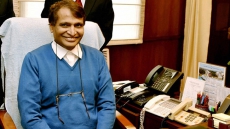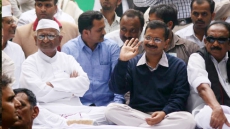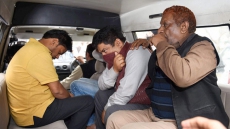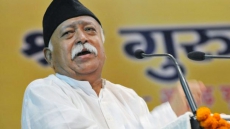The Delhi High Court Wednesday issued notices to the central and the state governments on steps being taken to deal with swine flu even as union Health Minister J.P. Nadda asked people not to panic.
Swine flu has claimed over 800 lives across the country this year.
A division bench of Chief Justice G. Rohini and Justice R.S. Endlaw issued notices to the union health minister, the city's health ministry, civic bodies and the lt. governor on the issue and sought their response by March 4. It was hearing a petition seeking directions to make tests for swine flu available at an affordable cost.
The bench asked the agencies concerned to "file response explaining the steps you have taken on the issue".
The public interest litigation (PIL) filed through advocate Gaurav Bahl said the government should provide more laboratories in the city for testing swine flu (H1N1 virus) and the facility should be available at an affordable cost.
"The government should establish multiple testing laboratories and that should be available at an affordable cost. Now, the cost of test is Rs.4,500. It has to be reduced," argued Bahl.
Currently, the government has only three laboratories in Delhi for swine flu tests, he told the court, adding that "the government should immediately establish multiple testing laboratories at all government hospitals wherein the identification test for swine flu can be conducted".
The plea challenged "the inaction and lackadaisical and perfunctory approach of the government" in effectively dealing with swine flu.
The plea sought direction to the government hospitals to keep medicines for the treatment of swine flu and ensure that sufficient and required amount of medicines are available with all hospitals and nursing homes of Delhi.
Making a statement in the Rajya Sabha, Nadda said there is no shortage of swine flu medicine.
He said the central government is in touch with all states and a regular review of the situation is being done. "There is no need to panic but we need to be alert."
The minister said the states have been supplied stock of medicine and other equipments like masks and vaccines and reserve stock is with the government.
"There is no shortage of medicine. We are also maintaining stock of drugs to meet sudden requirement. A panic is being created by reports, I have informed states. We told them they should have reserve stocks," Nadda said.
The minister's statement came as a clarification of his Tuesday's statement that he made in both houses of the parliament.
He said the number of deaths were because of ignorance. "Co-morbidity cases are high in number. Patients are coming late to doctors after taking medicine themselves."
Doctors have advised a number of precautionary steps against the disease which include washing hands multiple times a day, avoiding touching objects like doors, seats, tables, handles at public places and drinking a lot of water and fluids.




